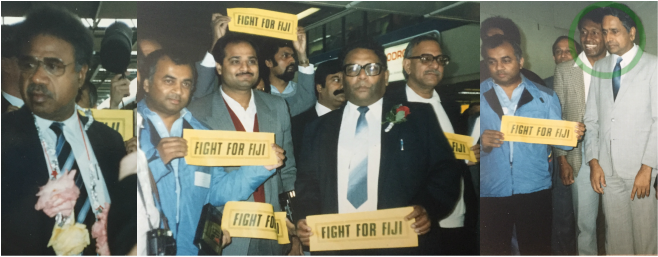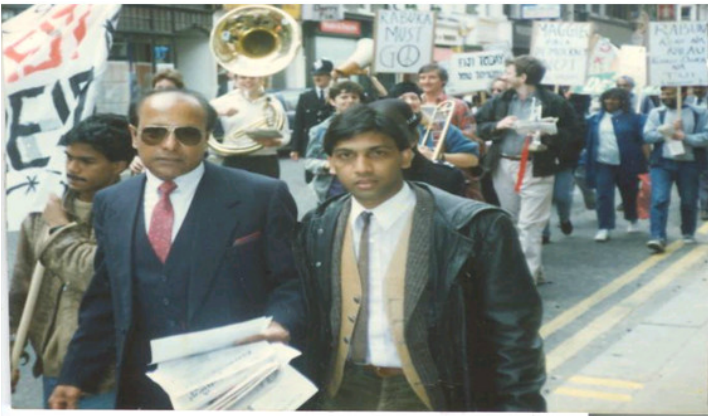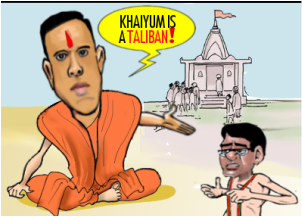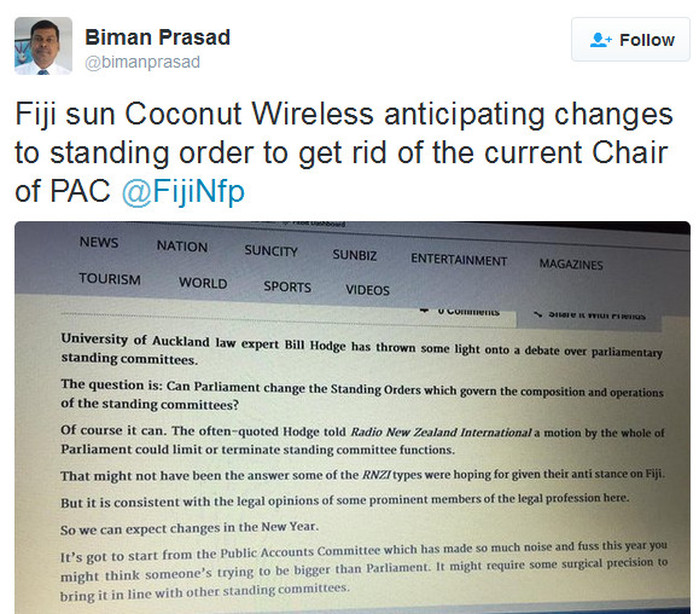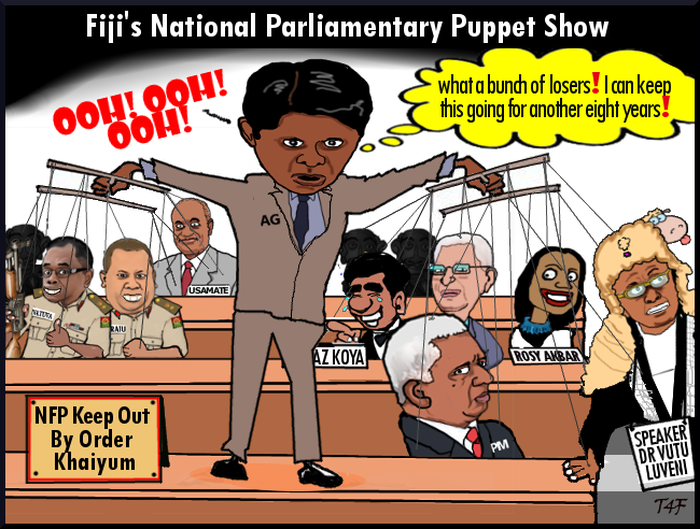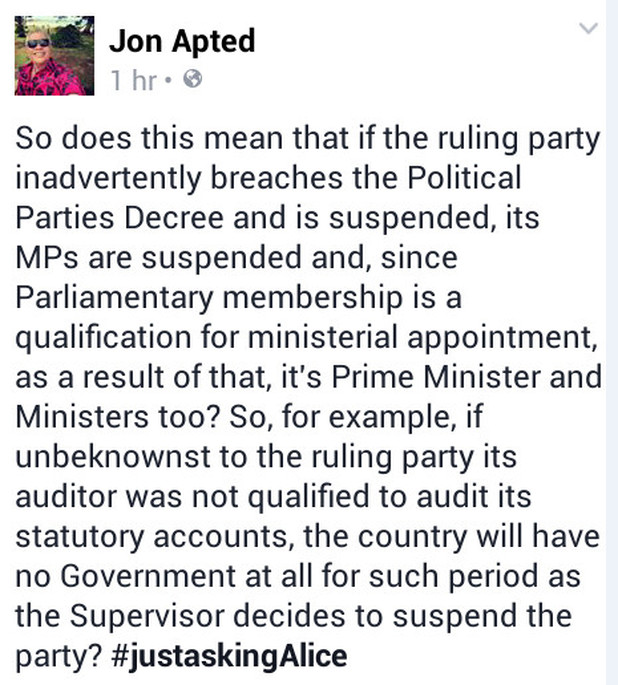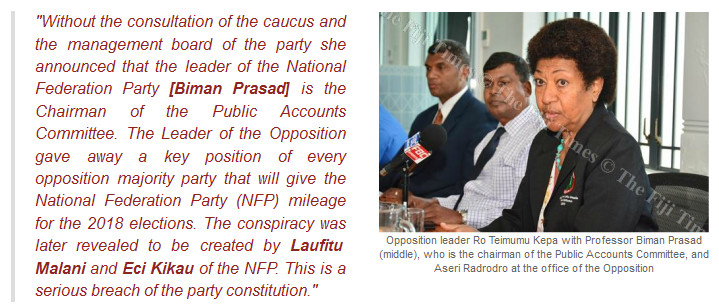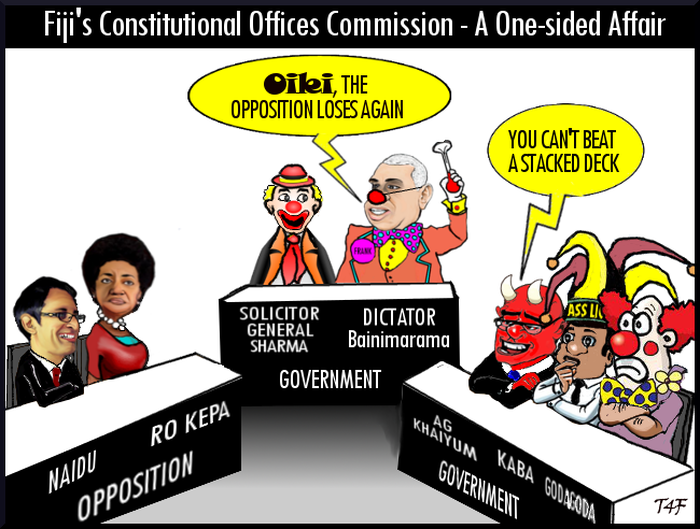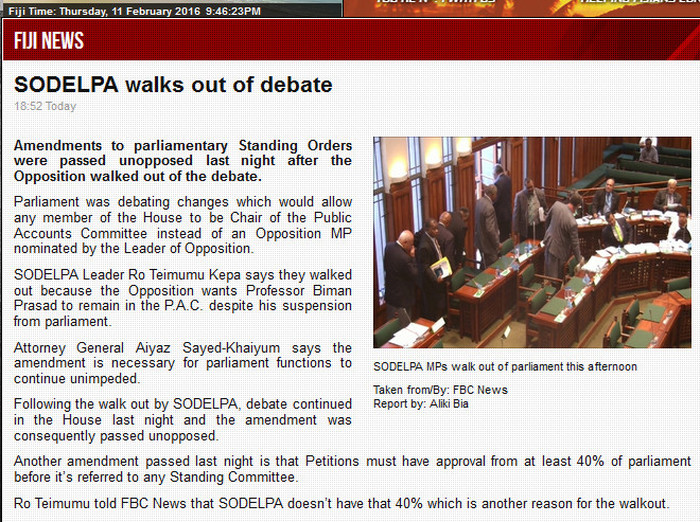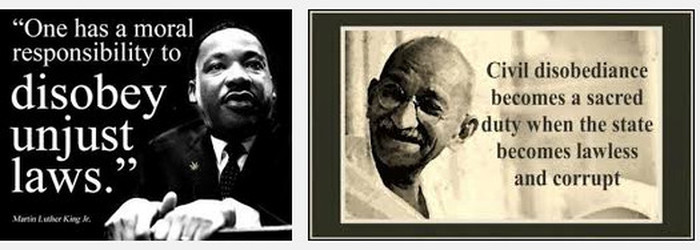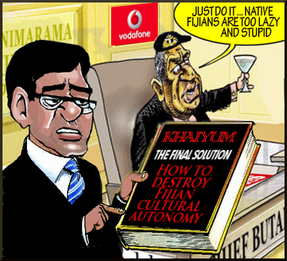HISTORY LESSON from Fijileaks Founding Editor-in-Chief and a stark warning to Aiyaz Sayed Khaiyum [He was our main 1987 bomb maker, and was guarded in the police cell by none other than a young naval officer called Voreqe Bainimarama, cheerleader of racist Rabuka; Khaiyum later fled to Australia, leaving other freedom fighters to carry the can]: "In 1987 we told dictator Sitiveni Rabuka and his marauding racist native Fijian gangs: 'Look here, you thugs - If you want violence, we will give you VIOLENCE...We are not going to subjugate ourselves to a constitution of this kind, signing away all our rights and agreeing to be slaves...I [Mohammed Rafiq Kahan] wanted you to test the guns that we are going to supply to our brothers [Indo-Fijians] here because Fiji is making a fool of itself in the world. There are traitors running this country...The [arms] were brought to Fiji for the protection of the Indian people during civil disturbances...Just because those who had been oppressed have not hit back is no reason to believe that they will forever remain compliant. The time will undoubtedly come when our patience will run out and, refusing to submit to further humiliation and deprivation, we will retaliate...Rabuka, you have left us no recourse but to exercise our right to rebel...to repeat poet Lovelace-Stone walls do not a prison make - Nor iron bars a cage'."
The regime's lapdog 'presstitute' newspaper - via Coconut Wireless - had already warned that Biman Prasad would be removed - written by none other than Aiyaz Sayed Khaiyum and Biman Prasad so it coming!
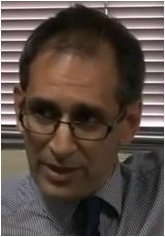
By Richard Naidu
Thursday, February 11, 2016
The Fiji Times
Only 20 sitting days have been allowed to Parliament this year. One has already been lost to a power blackout. So why did the Government waste so much time on Tuesday voting to suspend standing orders then debating and then voting through a motion to "endorse" the Speaker's suspension of NFP's Members of Parliament?
Parliament cannot vote to suspend MPs unless the Speaker has named them for disorderly conduct (Standing Order 76). NFP's MPs could not be guilty of that — they are not even there. So the Government motion is meaningless. But it may illustrate the poor understanding of certain of our current leaders of the role and function of Parliament in a democracy.
In a democracy, the people are supreme. That means that their representatives have the right to speak for them at all times, subject to very narrow exceptions. This is not a right of the parliamentary representatives or their political parties, but of the people they represent. That right cannot lightly be taken away.
Perhaps the Government's "endorsement" motion is an attempt to put beyond judicial scrutiny the Speaker's decision (apparently on the advice of the Solicitor-General) to suspend NFP's parliamentarians. Time will tell whether that is correct. But a decision by a public officer, such as the Speaker, is still a decision and the law (whatever the law is) applies to that decision. A meaningless "endorsement" does not change the law in relation to that decision.
More curious is Mr Sayed-Khaiyum's justification of the Speaker's decision to suspend the NFP parliamentarians in the first place. He appears to think that "any duly elected Member of Parliament must be a representative of a registered political party" (which is not correct — independent MPs may be elected).
"Logically and consequently", he says, "the suspension of registration of a political party must have the effect of suspending that party and its members from Parliament".
But that is not what the Political Parties Decree says. Section 27(6) says clearly that if a party is suspended for an offence against the decree, its MPs continue to hold their parliamentary seats. So why would it "logically and consequently" be different for a party such as NFP, suspended merely because it is accused of not having its audit signed off properly?
But let us assume (perhaps in the face of the obvious) that Mr Sayed-Khaiyum is right. That would mean that, if his FijiFirst Party is suspended, for some (real or imagined) breach of the Political Parties Decree, "logically and consequently" Government would come to a halt. In a democracy, the Government derives its authority from Parliament.
Under Mr Sayed-Khaiyum's Constitution, a minister can only be a minister if he is a Member of Parliament. So if a minister does not qualify to sit in Parliament (on account of his or her party being suspended), he or she cannot function as a minister. Is this "logically and consequently" how the country is supposed to be governed?
This is not "true" democracy. This is "Alice in Wonderland" democracy.
Government is a business to be carried on with respect for everybody. It is not something you make up as you go along just so you can win today's argument.
An institution such as the Parliament (the legislature) is supposed to be separate and independent from the executive side of Government (the ministers and the civil service). This is why it is important for Parliament to have experienced, professional — and most importantly, independent — legal advisers of its own.
* [Fiji Times] Editor's note: Mr Naidu is one of The Fiji Times lawyers, who from time to time, advises the paper. He has also acted for the NFP in respect of the party's suspension by the Supervisor of Elections. The views in the letter are his own.
Fijileaks: SODELPA MPs have spent too much time singing the same racist, indigenous songs in Parliament, and as a result will remain on the Opposition benches come 2018 general election (if it is held at all); just look at the "The Gaunavinaka Report" oozing with racism against NFP leader Biman Prasad and Suva lawyer Richard Naidu; incidentally, Kepa has stood up to few racist bigots in SODELPA re for Prasad and Naidu
"It is unfortunate to state that the appointment of Richard Naidu as the Opposition’s nominee was the decision of the Leader of the Opposition alone and did not reflect any consensus with the caucus or the party. She pushed her way through to get her choice despite members of the caucus suggesting other nominees
By Vijay Narayan
Thursday 11/02/2016
Attorney General Aiyaz Sayed-KhaiyumParliament has passed amendments to the parliamentary standing orders which sees changes regarding the chairmanship of the Public Accounts Committee, the handling of issues by committees, how to deal with petitions and bills.
Members of the opposition did not want the changes and walked out in the middle of the debate. Attorney General Aiyaz Sayed-Khaiyum tabled the proposed amendments late this afternoon.
The Standing Orders passed in 2014 stated that the Public Accounts Committee may only elect an opposition member as Chairperson. The amendment passed today says that the Public Accounts Committee members can appoint any member of the committee as Chairperson. The section saying that only an opposition member be appointed as Chairperson of the Public Accounts Committee is deleted.
There are three government MPs and two opposition MPs in the standing committees.
Sayed-Khaiyum says anyone from the committee can take up the chairmanship and this totally depends on the committee itself.
The opposition is concerned that a government MP will now lead the Public Accounts Committee. Suspended MP Biman Prasad is the Chairman of the Public Accounts Committee. Another amendment says that Parliamentary Standing Committee members can vote to change the Chair of the committee every 12 months if they wish to do so. Sayed-Khaiyum also says parliamentary standing committees must not examine the merits of underlying policies.
Another change says that any petition to be brought into parliament must be put to a vote.
If 40% of parliament agrees to the petition, then it will be referred to the standing committee. The current practice has any MP bringing in a petition and it is then referred to the committee. Opposition Leader Ro Teimimu Kepa opposed this change and called on the Speaker Doctor Jiko Luveni to seek legal advice before going ahead with the debate.
Doctor Luveni says she does not need to get advice and the debate will continue.
Another major amendment states that bills are to only be brought in by the government side. Other MPs can bring in private bills.
The amendments were passed as there was a quorum and parliament continued despite the opposition walkout. Source: Fijivillage News
